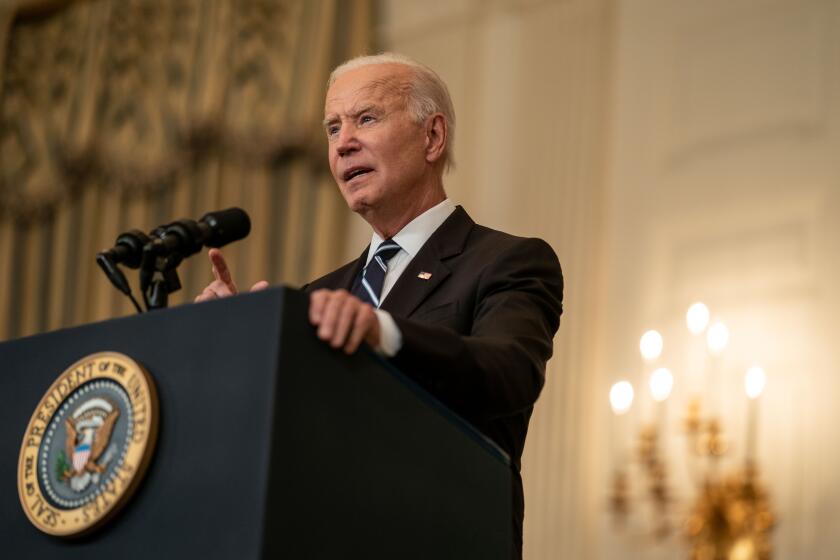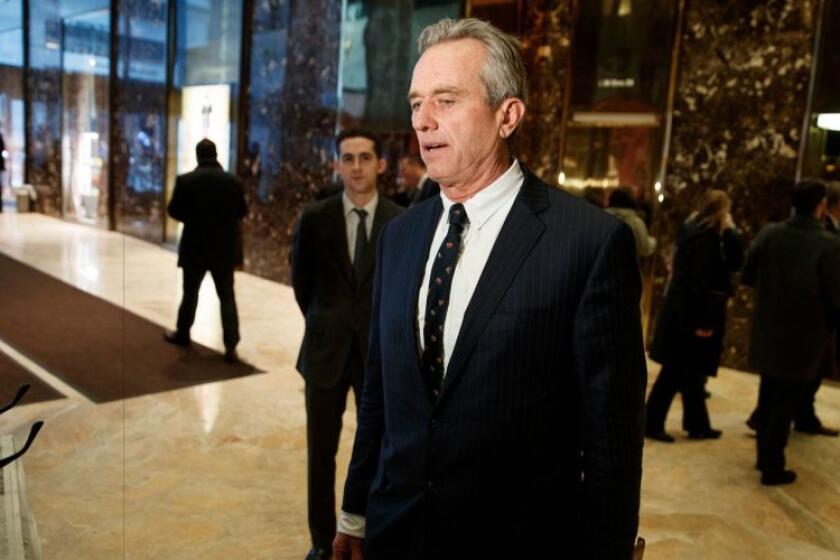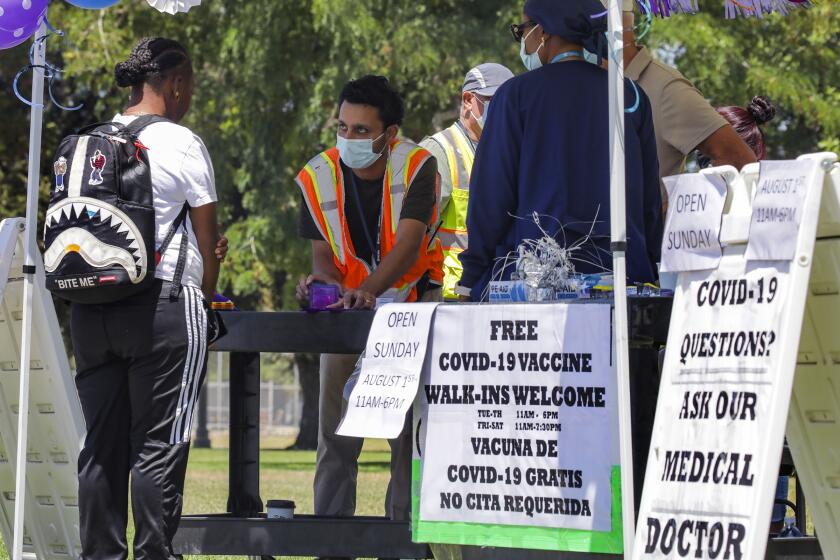Column: Should you believe the vaccine mandates will cause mass resignations? Probably not

- Share via
It’s no secret that the pandemic has been a rich breeding ground for infectious balderdash of every description. Get ready for a whole new genre.
We’re talking about reports of mass resignations provoked by vaccination mandates. These are beginning to percolate through the press and social media.
For the most part, there’s less in the reports than meets the eye at first glance. That’s an early sign that they should be treated with extreme care and skepticism, just like reports of “miracle cures” derived from livestock medications, bleach, and UV lights.
While there is this ‘great resignation movement’…what we’re seeing [is] typically not related to the vaccine.
— Alexander Alonso, Society for Human Resource Management
Employers in certain business segments have been fretting for months about whether requiring workers to be vaccinated against COVID-19 will result in a surge of quitting.
That’s why some have avoided imposing vaccine requirements on members of their workforces with the least to lose — low-income front-line workers such as cashiers at Walmart, for example, while keeping them in place for those who have their eyes on career goals, including middle managers.
Get the latest from Michael Hiltzik
Commentary on economics and more from a Pulitzer Prize winner.
You may occasionally receive promotional content from the Los Angeles Times.
The vaccination mandate proposed last week by the Biden administration and aimed at employers with more than 100 workers should diminish those concerns. Rank-and-file workers who refuse vaccines on the assumption that they can just move on to less-demanding employers will have fewer options.
Workers in healthcare fields, where vaccination refusal rates were inexplicably elevated, also will have fewer choices, especially as the Biden administration is mandating vaccines for all employees of healthcare facilities that treat Medicare and Medicaid enrollees. That’s the vast majority.
That rule alone may make the episode earlier this summer at Houston Methodist Hospital a relic of the past. After the hospital mandated that all employees get vaccinated against COVID-19, more than 150 refused. They were fired.
President Biden’s COVID-19 vaccine mandate will save lives, and should withstand legal challenges.
Several had challenged the mandate in a lawsuit, arguing that the vaccines were “unapproved” and they were being treated as “guinea pigs.”
Federal Judge Lynn N. Hughes made short work of these arguments, ruling in June that the hospital was well within its rights to condition employment on vaccination. The resisting workers “will simply need to work somewhere else,” he ruled. “Every employment includes limits on the worker’s behavior in exchange for his remuneration. That is all part of the bargain.”
Of course, now, what with the Pfizer vaccine having received formal approval from the Food and Drug Administration and the federal government accepting no substitutes for healthcare workers getting the shots, the 153 Houston workers who quit rather than get vaccinated may have to go scraping for jobs.
In any case, the hospital says that the 153 resigning or fired workers represented about 0.6% of the hospital’s nearly 25,000 employees.
Reports from news sources and social media reflect a similar order of magnitude, or less. The most prominently reported case involves Lewis County General Hospital in rural upstate New York. There, the resignations of six employees and the possibility that seven others would refuse to get vaccinated will force the hospital to temporarily “pause” maternity services starting next week, according to hospital officials.
This will cause an inconvenience for the community but probably not a crisis. The hospital delivers about 200 babies a year, well below the state average of more than 1,000 or the national average of almost 600. Hospitals with functioning maternity departments are 15 and 30 miles away.
The hospital administrators say about 20 of their unvaccinated clinical staffers have resigned since New York state imposed a vaccine mandate on healthcare workers, but 73% of the health system’s 650 employees are vaccinated. That’s a better rate than in the region as a whole: Lewis County’s overall vaccination rate of 40% is among the lowest in the state.
The anti-vaccine movement has a new conspiracy theory about Pfizer’s COVID-19 shot. Don’t believe them.
The county also has the highest COVID test positivity rate in the state, officials said. The region has had a problem finding professional staff for its healthcare facilities for a long time, possibly due to its remoteness.
The other big yarn making its way around the internet concerns a Lt. Col. Paul Douglas Hague, who is supposedly a 19-year veteran stationed at Ft. Bragg, N.C.
According to a letter purportedly sent to his superiors and tweeted out by a woman who says she’s his wife, Katie Phipps Hague, the Army officer is resigning his commission to protest the “unlawful, unethical, immoral, and tyrannical order to sit still and allow a serum to be injected into my flesh against my will and better judgment.”
The letter goes on to grouse at “an ideologically Marxist takeover of the military and United States government at their upper echelons.”
A few points about this:
I haven’t been able to confirm that Lt. Col. Hague exists or if the resignation letter is genuine, but it is the sort of missive that makes you go “Hmmm...”
According to the letter, Hague will be resigning at least several months short of his eligibility for a military pension, which comes with 20 years of service. For a lieutenant colonel, for which rank the base pay is $114,670, a 20-year pension would be worth about $57,335, or $4,778 a month. That makes his stand an expensive one to take, especially given its basic illogic.
It fails to mention, for example, that even before the COVID pandemic active-duty members of the military were required to be vaccinated for up to 17 diseases. Of these, the most common are measles, mumps, rubella, polio, flu, smallpox and tetanus.
Why a military officer would decide to cop an attitude over the COVID vaccine just now isn’t clear, unless he’s been infected by the absurd, partisan campaign that has made refusing the shot a litmus test for right-wing cred.
Employer fears of vaccination mandates could empower a worthless alternative: corporate ‘wellness’ programs.
Nevertheless, you can expect to see this missive and perhaps a few others like it shot around social media in coming weeks to promote disobedience to vaccination mandates.
One other category of news report may be the treatment of a small number of refusniks as the vanguard of some sort of mass movement.
After Baltimore told all city employees to either get vaccinated by Oct. 18 or submit to weekly COVID-19 testing, an order that covered almost 14,000 individuals, local news crews beat the bushes to find objectors. The CBS station found ... one, a healthcare worker who said she was quitting but who refused even to be quoted by name.
More responsible and credible reports indicate that vaccination mandates are doing their job, which is to force holdouts to reconsider.
Delta Air Lines says that its threat to start charging holdouts more for their health coverage spurred 20% of their unvaccinated workers to get the shot. At United Airlines, which mandates vaccinations for all employees and gave its workers five weeks to comply, half of the unvaccinated employees had gotten their shots within three weeks.
Anti-vaccine activists may have more bark than bite. The San Diego Police Officers Assn. said last week that 65% of its members responding to a recent survey said they would consider quitting if the city enforced a vaccination mandate scheduled to take effect Nov. 2.
But only 38% of the union’s more than 1,900 members responded at all, leaving it unclear whether the responses overrepresented vaccine holdouts or whether those who claimed they might quit would actually follow through. Jobs with public law enforcement agencies unwilling to enforce vaccinations may become harder and harder to find.
Human resources professionals say that objections to vaccination are steadily disappearing.
At a recent briefing, the Society for Human Resource Management said its surveys showed that although 28% of workers said in December that they would rather leave their job than take a vaccine, now “what we’re seeing is that number is roughly less than two percent,” Alexander Alonso, the society’s chief knowledge officer, said at the briefing. “So while there is this ‘great resignation movement’ … what we’re seeing [is] typically not related to the vaccine.”
Vaccine mandates are broadly popular in the U.S. and have been spreading fast since the FDA approved the Pfizer vaccine. The betting here is that they will continue to spread and become routine as public employers, colleges and universities, big employers and retailers and entertainment venues put them in place.
There will be occasional inconveniences caused by resignations, as at Lewis County General Hospital. But they’re likely to ebb as vaccine refusal becomes recognized as a fringe sentiment, which is what it is. The lesson in this case, as it has been with wild claims about COVID remedies, is to listen not to lunacy, but to reason.
More to Read
Get the latest from Michael Hiltzik
Commentary on economics and more from a Pulitzer Prize winner.
You may occasionally receive promotional content from the Los Angeles Times.














